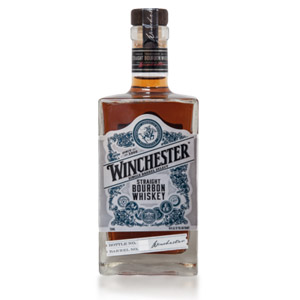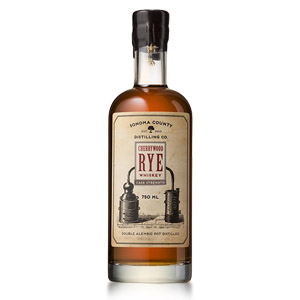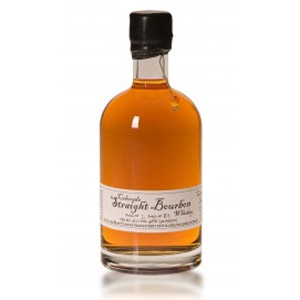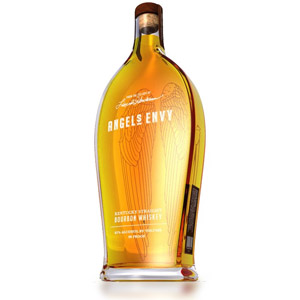If you want to start a slap-fight amongst self-styled whisky aficionados, all you have to do is bring up the recent phenomenon of “rapid aged” whiskies, otherwise known as “technology aged” whiskies. The usual stance of haughty affront is somewhat understandable when you consider that much of whisky’s appeal comes from its romantic associations with the little-understood magic of oak barrel aging. Most people agree that oak has pronounced positive effects on grain-based spirits, and that those effects tend to become more positive the more years are spent in the barrel. Just look at the NAS debate to discover how much barrel-aging means to the majority of whisky appreciators.
So imagine the reaction that such a person would have to the idea that you could replicate some of that aging effect via the use of various rapid technological processes, including the use of intense light, pressure, or ultrasonic vibration, and that the effect of oak aging could be induced over the course of hours, days, or weeks rather than years or decades. “Balderdash!” they might say (or maybe something more colorful).
Personally, I have now tasted two of these “technology-aged” products, and have attempted to maintain an open mind on the subject. Just like my stance on NAS, my stance on “technology aging” is that the proof is in the pudding. If it tastes better and is priced lower than equivalent traditionally-aged whiskies, I am willing to participate. For examples, see my reviews of Lost Spirits Ouroboros and the Abominations. There, my conclusion is that Lost Spirits’ proprietary technology aging process produces eclectic and enjoyable whiskies (also rums) that basically create their own market niche. They neither replace traditionally-aged whiskies, nor even compete directly against them. They might as well have a shelf to themselves in the liquor store, and I will continue to buy them.
Enter competitor TerrePURE Spirits, based in Charleston, South Carolina. A little Googling can tell you what you need to know about the technology, so I’ll just summarize it by saying that they use ultrasonic vibrations to induce chemical reactions in a young spirit (in this case, 2 year-old sourced bourbon), likely with inserted oak staves. This has a variety of effects, including filtering out congeners which cause off-flavors, building mouth-feel by esterification of fatty acids, and improving color absorption from the wood without added colorants. Due to alcohol labeling laws, Winchester Straight Bourbon must be first aged in new charred American oak barrels (the “old” way) for at least two years before it can undergo this “ultrasonic filtration”. The Winchester brand also sells an “Extra Smooth Bourbon” and a “Rye Whiskey”, which do not have this 2 year requirement. The Winchester brand is made by TerrePURE as a private label for sale at Total Wine & More stores. The bourbon is bottled at 45% ABV and sold for around $25 per 750ml bottle.
Nose: Sweet, floral, tutti-frutti. Deeper in the glass is bubblegum and kiwi, green apple, green pear, and a fake almost-cloying corn-syrup note like cheap drugstore candy. Smells EXACTLY like McAfee’s Benchmark Old No. 8.
Palate: Thin. Sweet up-front, like liquid tart candy. Apple skins, fresh corn, bottled light corn syrup. Very little tongue burn, but there is a background acrid plastic note and a grainy corn-whiskey note.
Finish: Short. Simple, fruity. Fades with a bit of barrel-char bitterness, which is the first note of oak I’ve tasted yet. That acrid plastic note returns, now tinged with menthol… like mouthwash. Ends with a flourish of honey.
With Water: A few drops of water dull some of the fruit and release a wave of vanilla extract. The finish is a little more tart. Water optional.
Overall: At first it reminded me of McAfee’s Benchmark in that it smells highly floral and fruity for a bourbon, and comes across the palate thin and insubstantial, like an unaged corn whiskey. The whole is oddly candied, and has fruit notes like you’d imagine finding in beakers at a candy factory lab, but with a lurking background of cheap-tasting acrid grain. This, my first impression of the TerrePURE technology, is that in the process of stripping unwanted by-products of bourbon distillation, they’ve also stripped much of what makes a whiskey taste like bourbon. This leaves you with a kind of bourbon-flavored corn brandy. Weird, and not very pleasant if you’re expecting bourbon. If you’re used to flavored vodka, this might not taste awful, but you’d be far better off buying something like Four Roses Yellow Label, which is a far superior introduction to real bourbon, and cheaper to boot.
In this case, at least, the naysayers have it right. TerrePURE technology aging has turned bad sourced 2 year-old straight bourbon into bad technology-aged straight bourbon. No thanks.









“Personally, I have now tasted two of these “technology-aged” products, and have attempted to maintain an open mind on the subject. Just like my stance on NAS, my stance on “technology aging” is that the proof is in the pudding. If it tastes better and is priced lower than equivalent traditionally-aged whiskies, I am willing to participate.”
Unfortunately, “technology-aged” products and NAS aren’t equivalent; the former, while perhaps controversial, is an actual production process while the latter is simply denial of the impact of a production process (“it doesn’t matter how old it is anyway, so you don’t need to know the age”). There’s nothing “non-traditional” about the production or processes involved in most NAS products and the influence of age is undeniable, if unstated, regardless of anyone’s assessment of the quality or what they think of the price. The issue isn’t so much that older is better, but that age, in and of itself, matters, and that people who want more information won’t get it while accepting less.
The idea that any given NAS-labelled product delivers better and or cheaper whisky for its age (whatever that happens to be) is a very debatable point – where is the pudding that shows any of these products are better or cheaper for being NAS? It seems far more likely to me that NAS has been embraced to inflate the price of young whisky to the unsuspecting – and inflate the price of older stuff as well through attrition – than it was ever any attempt to give the little guy a break using some whisky hocus pocus that no one can clearly articulate.
If age really doesn’t matter to whisky, why is everybody now trying to find technological shortcuts to simulate its effects?
I have to concur with SN on this one. I just happened to pick up a mini of this guy along with its “Extra Smooth” brother in the mini-bottle bin at Total Wine, $0.99 each. Whether technologically enhanced or not, this is a true dud – bitter and flavorless. On a brighter note, I had the opportunity to visit one of my favorite whisky bars in the world last night…McCormack’s in Richmond VA. Mac treated us to his 1974 31-year old Highland Park to close the evening. It featured a honeysuckle nose that was simply magnificent. Nothing like what HP (or anyone else for that matter) bottles these days.
A bourbon with real byte? ?